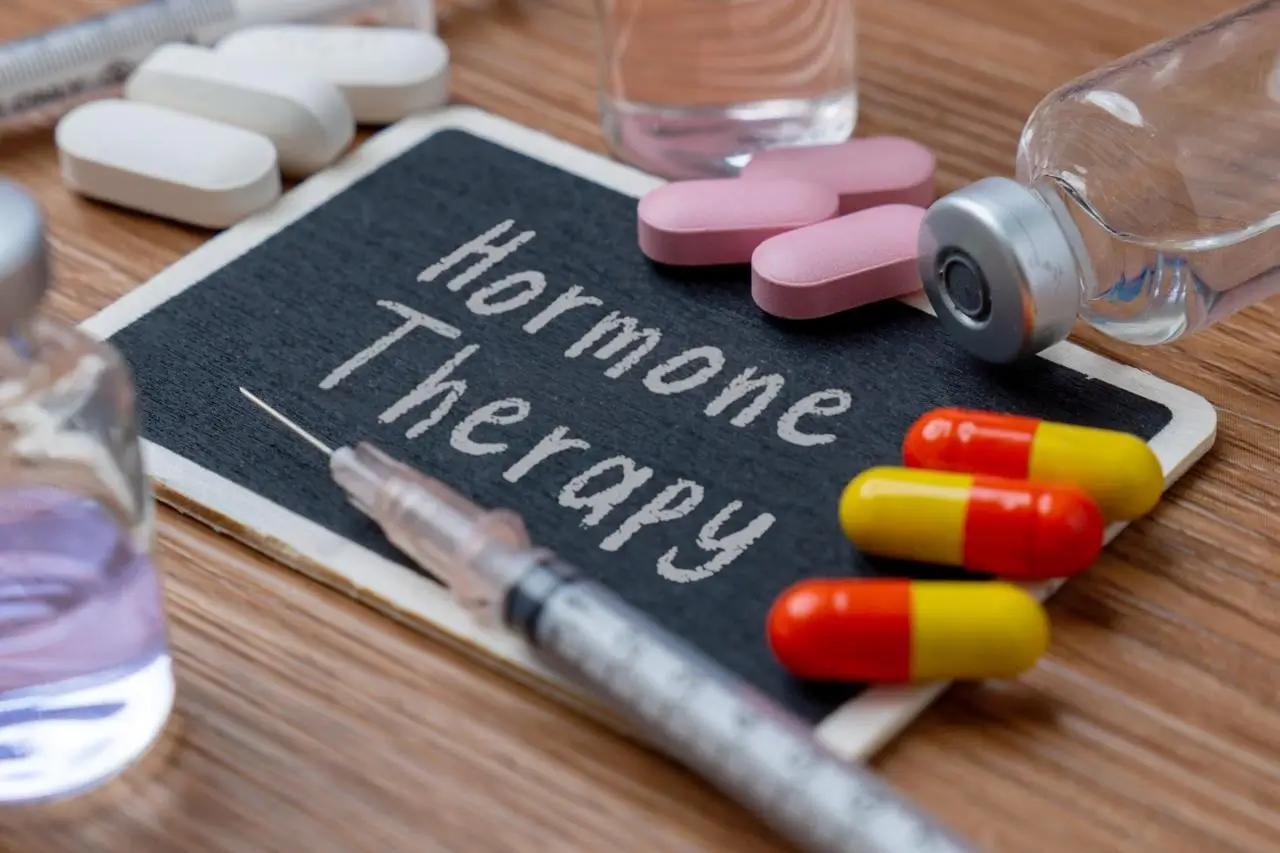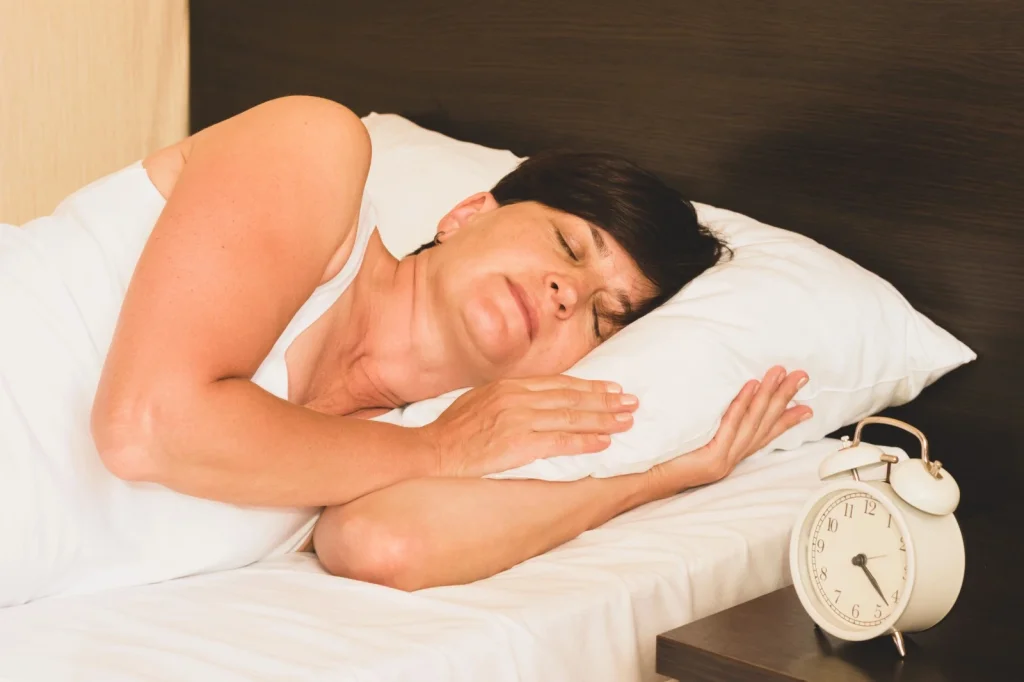

When was the last time you slipped into bed, drifted into deep sleep within minutes, and woke up with that rare feeling — Oh, I actually rested?
For many women in their 40s and 50s, this question brings a sigh or even a laugh.
Sleep, once effortless, starts feeling like a puzzle — and every night becomes a negotiation with your own body.
If you’re waking up at 2 a.m. for no reason, tossing through the night, or feeling wide-awake and wired just when you want to slow down… it’s not “just stress,” and it’s definitely not “in your head.”
It’s hormones — and the delicate dance they perform to regulate sleep.
This guide breaks down exactly how sleep and hormones are connected, which hormones influence your rest the most, why sleep gets worse during perimenopause and menopause, and what research-backed strategies can genuinely help.
You already know sleep is important — but what’s less known is how deeply it shapes every system in your body.
When you sleep well, your brain:
processes and clears toxins
regulates emotions
repairs cells
strengthens memory
sharpens decision-making
resets stress systems
And your body:
repairs tissues
restores immune cells
regulates appetite
balances inflammation
stabilises hormones
Every hour of sleep is like a quiet maintenance shift, where your body runs all its essential repairs.
This is why disturbed sleep — a signature perimenopause and menopause symptom — feels like everything is crumbling at once:
your mood, your focus, your energy, your digestion, even your weight.
But there’s good news: your sleep can return when your hormones are supported.
Before we get there, let’s ask…
Many people think sleep is controlled by melatonin alone — but melatonin is just one player in a much bigger hormonal network.
Here are the key hormones that regulate sleep:
Often called the sleep hormone, melatonin controls your circadian rhythm — your 24-hour sleep–wake cycle.
Rises at night → signals the brain to rest
Drops in the morning → signals wakefulness
But melatonin depends heavily on estrogen and progesterone.
When those hormones drop, melatonin production drops too, leading to:
difficulty falling asleep
waking up frequently
lighter, more fragmented sleep
early morning waking
Research shows that lower estrogen is linked with significantly lower melatonin levels — one of the reasons sleep problems spike during perimenopause and menopause.
Progesterone is often called the “soothing hormone.”
Here’s why:
It increases GABA — a calming neurotransmitter
It relaxes the nervous system
It promotes deep, restorative sleep
When progesterone drops (often dramatically) in your 40s, especially during perimenopause, women experience:
anxiety
racing thoughts before bed
restless sleep
repeated night-time waking
Many researchers now consider progesterone deficiency one of the biggest sleep disruptors in midlife women.
Estrogen influences almost everything related to sleep:
melatonin production
temperature regulation
serotonin stability
REM sleep
mood
bladder function
pain perception
When estrogen levels fluctuate (as they do wildly in perimenopause), women experience:
night sweats
overheating
insomnia
restless legs
migraines
increased urination
mood swings
All of these interfere with sleep.
A landmark Newson Health survey found that 79% of perimenopausal and menopausal women reported sleep issues — making it one of the top five symptoms.
Cortisol should be high in the morning and low at night.
But fluctuating midlife hormones often flip this curve.
Effects of elevated night-time cortisol:
wired-but-tired feeling
3 a.m. awakenings
difficulty returning to sleep
daytime fatigue
increased anxiety
High cortisol is one of the biggest barriers to deep rest — and women are more vulnerable to this disruption during hormone transition phases.
Most women don’t realise testosterone affects:
energy
vitality
motivation
mood
sleep stability
Research from Newson Health shows that testosterone therapy improved fatigue and energy in 21% of menopausal women, indirectly improving sleep quality.
Let’s break this down clearly:
Imagine a dimmer switch constantly flicking between bright and dark.
That’s your hormone system during perimenopause.
These fluctuations:
disrupt body temperature
affect your brain’s sleep centres
reduce melatonin
destabilise serotonin
alter the stress response
This leads to unpredictable, often frustrating sleep.
Sudden heat surges are triggered by dropping estrogen.
These spikes can cause women to:
wake soaked
overheat
kick off blankets
struggle to fall back asleep
Vasomotor symptoms (hot flashes + night sweats) are strongly linked to poor sleep.
Low progesterone = low GABA = increased anxiety.
This creates:
racing thoughts at bedtime
panic upon waking
difficulty switching off
emotional sensitivity
These effects make sleep shallower and more fragile.
Estrogen keeps inflammation under control.
When it drops:
joints ache
muscles feel tense
chronic pain increases
Pain is one of the biggest disruptors of deep sleep.
Lower estrogen weakens pelvic floor tissues and bladder control.
This often causes:
more night-time urination
lighter sleep
difficulty falling back asleep
Let’s focus on solutions backed by current research.
HRT is the gold-standard treatment for sleep disturbances linked to hormonal decline.
Benefits include:
reduced hot flashes
stabilized mood
reduced night sweats
improved bladder symptoms
deeper, more stable sleep
improved energy during the day
Progesterone (micronised) is especially helpful because it’s naturally sedative and increases GABA.
Women often report:
falling asleep faster
fewer night awakenings
more restorative sleep
better mornings
If you’re struggling severely, speaking to a doctor about HRT may be life-changing. That’s why Miror has launched India’s first HRT Centre of Excellence, pioneering personalised hormone therapy designed exclusively for Indian women.
With world-class clinicians, advanced diagnostics and science-backed treatment plans, we’re bringing global standards of menopause care home.
Magnesium regulates:
melatonin
muscle relaxation
nerve function
stress response
Stress, caffeine, alcohol, and poor absorption can reduce magnesium in the body — making supplementation especially helpful for midlife women.
Magnesium glycinate, often paired with B vitamins, can:
reduce anxiety
relax muscles
deepen sleep
stabilize mood
Magnesium works quietly in the background of both Bliss and Thrive, helping you unwind, rest deeply and find steadiness again — no matter where you are in your menopause journey
Women sleeping in rooms around 18°C show:
fewer night-time awakenings
fewer flashes
deeper REM sleep
Cooling tips:
light cotton bedding
breathable nightwear
cooling pillow
fan or AC
avoiding hot showers before bed
Consistency supports your circadian rhythm.
Try:
same bedtime every night
same wake-up time
limit naps
reduce screen time before bed
A predictable rhythm trains your hormones and brain to wind down naturally.
Stress is one of the biggest enemies of sleep.
Try:
journaling your worries
slow breathing
dimmed lights
magnesium drink
light stretches
reducing blue light
All of these support melatonin and lower cortisol.
Alcohol helps you fall asleep — then breaks your sleep cycle entirely.
It reduces:
REM sleep
deep sleep
hormone balance
next-day energy
Caffeine stays in your system for 6–12 hours, so cutting it after 2 p.m. can dramatically improve sleep.
If you’re not on HRT or looking for additional support:
adaptogens (ashwagandha, maca)
magnesium glycinate
omega-3
vitamin D
phytoestrogens
evening primrose oil
can stabilise mood, ease stress, and support sleep architecture.
If you’re struggling with sleep during perimenopause or menopause, you’re not weak, dramatic, or “just stressed.”
You are experiencing a significant hormonal shift — and sleep is one of the first systems to feel the impact.
The good news?
With the right hormonal support, your deep rest can return.
Your energy can come back.
Your mood can stabilise.
Your nights can feel peaceful again.
You deserve that kind of rest — the kind that nourishes, repairs, and fills you back up.
Because good sleep isn’t a luxury.
It’s a vital sign.
The primary hormone responsible for sleep is melatonin, which controls your sleep–wake cycle. But melatonin doesn’t work alone — it depends on estrogen and progesterone to regulate its production. When these hormones fluctuate during perimenopause and menopause, melatonin drops, leading to lighter, more fragmented sleep.
Sleep worsens because estrogen and progesterone levels begin to fall and fluctuate unpredictably. Low progesterone reduces GABA (your brain’s calming chemical), while fluctuating estrogen triggers night sweats, anxiety, temperature spikes, and melatonin disruption — all of which sabotage restful sleep.
Yes. HRT is considered the most effective treatment for hormone-related sleep problems. It stabilises estrogen and progesterone levels, reduces night sweats and anxiety, improves melatonin function, and helps women fall asleep faster and stay asleep longer. Miror has now launched India's first ever HRT Centre of Excellence where all your HRT needs will be met effortlessly!
Magnesium supports sleep by activating the parasympathetic nervous system (your “calm” mode) and regulating melatonin. Many midlife women are deficient due to stress, caffeine, and poor absorption. Magnesium glycinate, in particular, can help reduce anxiety, relax muscles, and promote deeper rest.
A cool bedroom (around 18°C), a consistent bedtime routine, reduced alcohol and caffeine, dim lighting in the evenings, stress-reduction practices, and limiting screen time all support restorative sleep. Combining these habits with hormone optimisation (HRT or supplements) provides the best long-term results.



 ×
×

